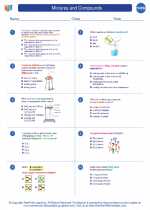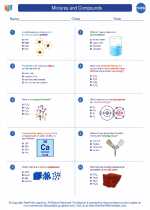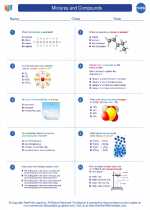Ideal Gas Law
The ideal gas law is a fundamental principle in the field of chemistry that describes the behavior of an ideal gas. It is a combination of the laws of Boyle, Charles, and Avogadro, and is expressed by the equation:
PV = nRT
Where:
- P = pressure of the gas (in atmospheres)
- V = volume of the gas (in liters)
- n = number of moles of the gas
- R = ideal gas constant (0.0821 L·atm/mol·K)
- T = temperature of the gas (in Kelvin)
Explanation of Variables:
- Pressure (P): The force exerted by the gas on the walls of its container.
- Volume (V): The amount of space occupied by the gas.
- Number of moles (n): The quantity of the gas in moles.
- Ideal Gas Constant (R): A constant that relates the properties of gases.
- Temperature (T): The temperature of the gas in Kelvin, where 0°C = 273 K.
Study Guide:
To understand and apply the ideal gas law, follow these steps:
- Convert temperature to Kelvin if it is given in Celsius by adding 273.
- Plug in the given values for pressure, volume, number of moles, and temperature into the ideal gas law equation.
- Solve for the unknown variable by rearranging the equation as needed.
- Pay attention to the units of the given values and ensure they are consistent in the equation (e.g., pressure in atm, volume in liters, temperature in Kelvin).
- Understand the conditions where the ideal gas law may not be perfectly accurate, such as at high pressures or low temperatures.
By understanding the ideal gas law and how to apply it, you can solve for various properties of gases and gain insights into their behavior under different conditions.
.◂Chemistry Worksheets and Study Guides High School. Mixtures and Compounds
Worksheet/Answer key Mixtures and Compounds
Mixtures and Compounds  Worksheet/Answer key
Worksheet/Answer key Mixtures and Compounds
Mixtures and Compounds  Worksheet/Answer key
Worksheet/Answer key Mixtures and Compounds
Mixtures and Compounds 

 Worksheet/Answer key
Worksheet/Answer key
 Worksheet/Answer key
Worksheet/Answer key

The resources above cover the following skills:
Chemistry II
Properties of Matter
Develop and use models to explain the differences between chemical compounds using patterns as a method for identification.
Use mathematical representations to quantify matter through the analysis of patterns in chemical compounds.